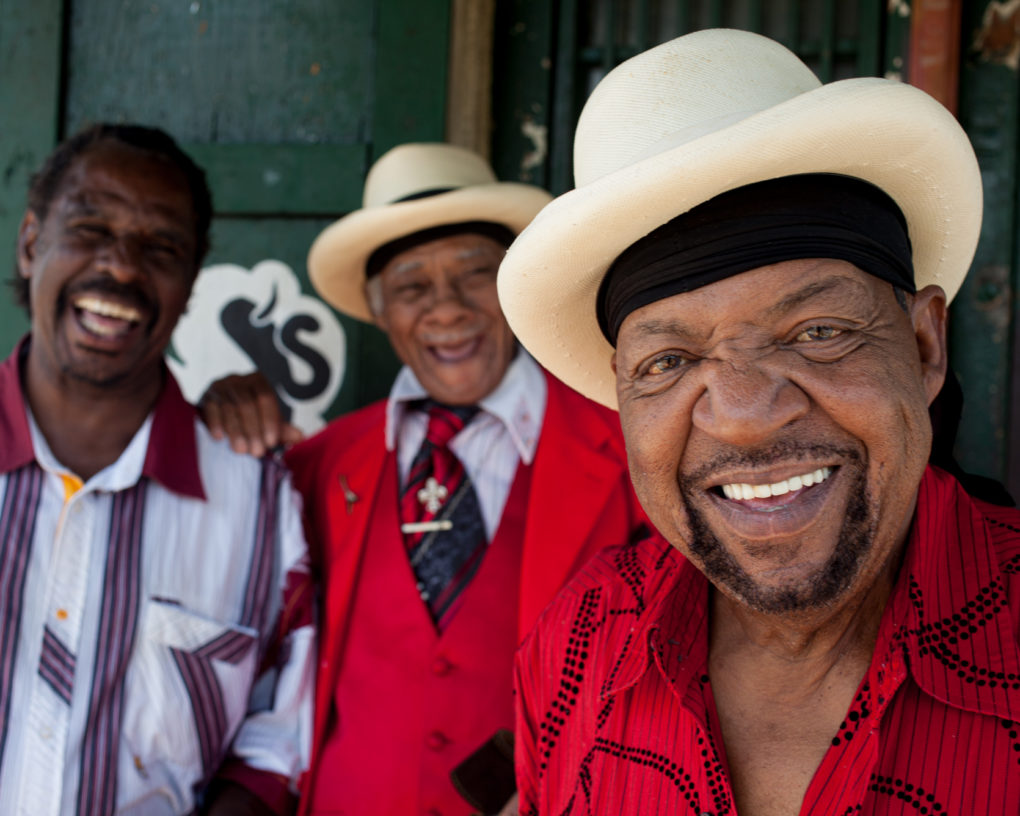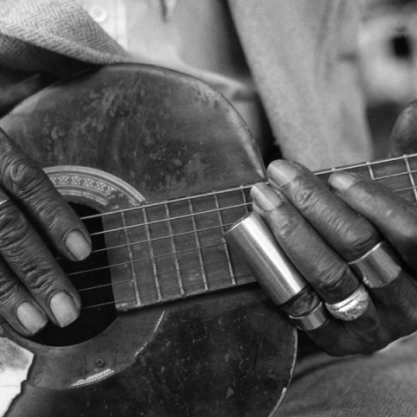“The Blues Was Always In New Orleans”

Downhome blues thrives in the crescent city and Music Maker artists plan performances during JazzFest.
By Nick Loss-Eaton
New Orleans may bring to mind jazz, brass band, and funk music, but less visible is a true downhome blues scene. With New Orleans as a common root of all this music and Music Maker’s mission to tend those roots, it’s a natural place for our work.
Guitar Gabriel and Taj Mahal have both spoken about the blues originating there and then moving up the river. A recent book by bluesman Chris Thomas King also makes the same assertion, with the citations to provide a convincing argument. Lonnie Johnson, born in 1899, was a widely influential New Orleans blues player listened to in Mississippi, Memphis, St. Louis, and beyond.
Fans have several chances to see Music Maker’s New Orleans artists perform in town during JazzFest:
April 27 and May 4 – Ernie Vincent – Sweet Lorraine’s
April 28 – Little Freddie King – DBA
April 29 – Little Freddie King – JazzFest, Blues Tent, 12:30pm
May 5 – Little Freddie King (solo) and Alabama Slim – at A Gallery For Fine Photography at 1pm at the opening of the exhibition Tim Duffy: Music Makers.
Tim Duffy came to New Orleans to try to find Little Freddie King in 1991, hearing of him from his professor while he was doing folklore fieldwork in Kenya. “You wouldn’t find him on Bourbon Street. I went to the roughest joint in town and there was Freddie playing,” he says. He’s been a Music Maker artist since close to the beginning, starting with a grant of new prescription eyeglasses for him. Duffy had already seen artists like Ironing Board Sam and Charles Jacobs on Bourbon St. in the ‘80s but Freddie introduced him to players off the radar of most blues fans. “When you meet Guitar Lightnin’ Lee and Freddie and [Alabama] Slim and Charles [Jacobs] and Ernie [Vincent] you feel that you’re part of a blues community,” Tim says. Music Maker artists Ironing Board Sam and Pat “Mother Blues” Cohen both did time playing in New Orleans. Music Maker artists Guitar Slim, Jr. and Charles Jacobs are also New Orleanian bluesmen.
King was drawn to New Orleans in his youth, growing up in McComb, MS. Duffy says, “If you’re down south in Mississippi, New Orleans is your city.“ At the age of 14, King hopped a freight train to New Orleans and never went back. With his trademark bicycle and outfits befitting his alter-ego “Dr. Bones.” Lightnin’ Hopkins’ cousin, Freddie has played every New Orleans Jazz & Heritage Festival except the very first, now over fifty years of appearances. The Guardian recently told King’s story, including his internal conflicts on whether or not to get vaccinated (spoiler: he got the shots).
Fellow dapper-dresser, the funk pioneer Ernie Vincent considers himself a blues player at heart, growing up in New Orleans hearing his uncles play guitar at fish fries on plantations in Thibodaux as well as rhythm & blues up and down Rampart Street, then black New Orleans’ key boulevard. “The blues was always in New Orleans. You gotta stop and think about it: The majority of people that was here, they was all from the countryside. They worked hard, they farmed, and they played blues on the weekend,” Vincent told New New South in 2013.
King’s other cousin and best friend Alabama Slim arrived in New Orleans at the age of 26, first hearing about the town in the lyrics to the blues classic “Baby Please Don’t Go,” recorded by John Lee Hooker and others. “People just get excited and joyful and just having a good time. They holler at you, ‘Play them blues!’ It’s all whopped up in there together. If they would stop and think about it, with that jazz and funk, they’s playing blues licks in there.”
There is one common denominator to these New Orleans blues players. Though their approaches vary, each places a high importance on the groove. Tim Duffy agrees, saying, “Little Freddie King is the king of the groove.”

Get involved
& give back
The Music Maker Foundation is a 501(c)(3) nonprofit organization that depends on thousands of supporters. Together, we work to meet the day-to-day needs of the artists who create traditional American music, ensure their voices are heard, and give all people access to our nation’s hidden musical treasures. Please contribute or shop our store today.
